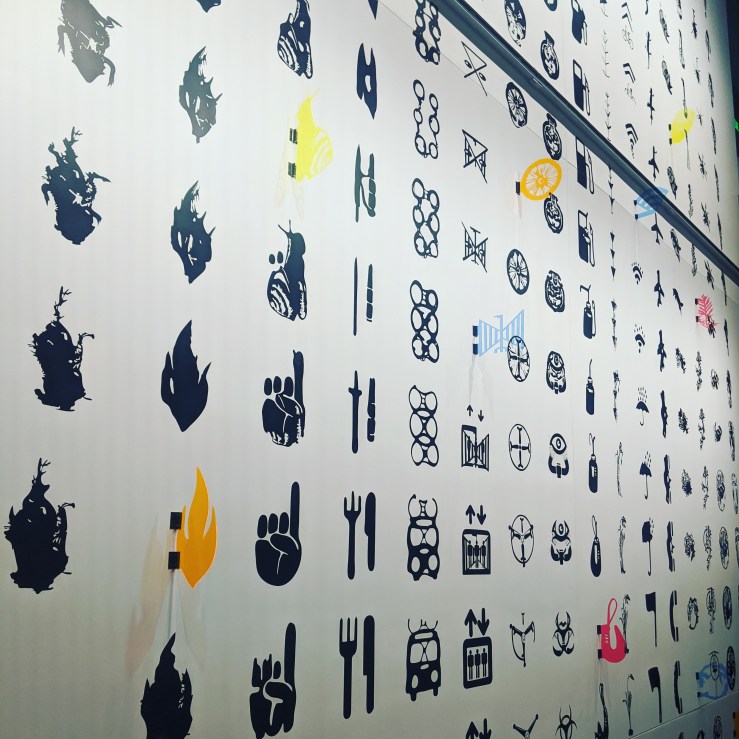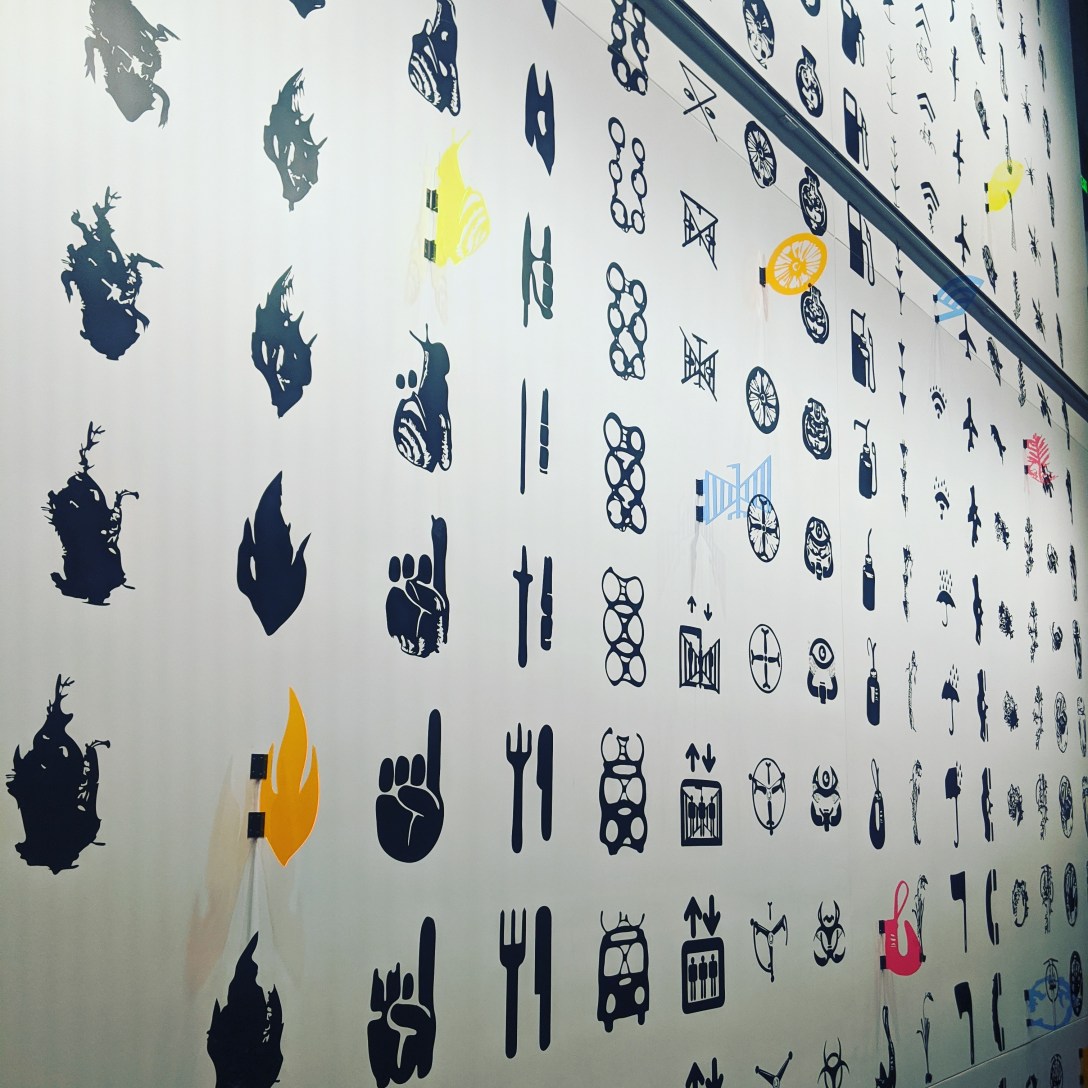The large print edition of Because Internet is now a thing that exists, in case you need to explain how we talk online these days to a person in your life who likes large print and hasn’t already gone for the resizable-text ebook.
If you’re in the Montreal area, I’d appreciate people’s support these days for my local indie bookstore, Argo Bookshop, which did the book launch party and signed copies of Because Internet, and are now facing the loss of foot traffic like all small, “non-essential” business. Argo takes orders online (now including gift certificates and local delivery!) and everyone who goes to their events would really like to see them still be there after this!
A lot of linguistics professors started scrambling to move their courses online this month, so I revised and updated my post with a very long list of linguistics youtube channels and other free online videos about linguistics, and did a couple threads answering questions about further resources that people were looking for.
The popularity of our existing linguistics resource roundups led Lauren Gawne and I to launch Mutual Intelligibility, a project to connect linguistics instructors with existing linguistics resources suitable for teaching online in a bite-sized, easy-to-digest fashion. (Also potentially of interest to linguistics fans who want a distraction from the news cycle.)
We’re putting up thrice-weekly Mutual Intelligibility newsletters for the next while: on Mondays and Wednesdays short “3 Links” posts on a particular topic, and also on Fridays six longer Resource Guides diving deep into topics with a whole bunch of resources. We’re fortunate to have Kate Whitcomb and Liz McCullough (different spelling, no relation) along to help us make them. Thanks to everyone who has sent in queries and suggestions!
Read our first Mutual Intelligibility newsletter here, check out the archive so far, and put your email here to get future themed linguistics resource updates.
Because Lauren Gawne is essentially my partner in all forms of business, we also spent a substantial amount of time this month working on scripts for Crash Course Linguistics, along with Jessi Grieser and the Crash Course team. (Nothing official to report yet but stay tuned!)
The main episode of Lingthusiasm was about the tricky question of what makes a language “easy” (Spoiler: it’s not that straightforward).
The Lingthusiasm bonus episode was about teaching linguistics to yourself and other people — how to articulate what you find so cool about linguistics (and other complex topics you may find yourself needing to explain). We also experimented with doing live listen-alongs of new Lingthusiasm episodes on Discord, and made a Lingthusiasm Turing Test, where you can see how well you can identify which Lingthusiasm quotes are real and which robo-generated.
Lauren and I also announced that we’re giving out a second LingComm Grant, thanks to the support of Claire Bowern’s NSF grant. If you’re a linguist with a linguistics communication idea that could use a $500 boost to make it, you can apply at lingcomm.org by June 1. (Also a reminder that there are no conditions on how the grant money is used, so if you need it to take care of some living costs so that you can allocate your time to a project, that is totally fine with us!)
This month’s media hits:
National Print/Top Online:
- Kottke.org – feature “Weird Internet Careers”– 3/9
- Financial Times – mention – 3/15
- CNBC’s Make It – feature “How not to sound like a jerk (and communicate effectively) over Slack and email, according to a linguistics expert”– 3/18
- Mel Magazine – feature “WILL CORONAVIRUS FINALLY END THE SCOURGE OF ‘I HOPE THIS EMAIL FINDS YOU WELL’? ”– 3/26
- The Guardian – Solitary refinement: a lockdown survival guide – mention – 3/27
- HerCampus.com – roundup “3 Books To Read While Stuck At Home” – 3/30
Newsletters:
- Austin Kleon newseletter– mention with Weird Internet Careers – 3/6
- Dense Discovery – mention – 3/23
Podcasts:
- Science Friday’s Science Diction podcast – interview – 3/10
- Inquiring Minds podcast – interview – 3/24
Local Print/Online:
- The Daily Emerald – review – 3/2
Selected tweets:
- Tips for communicating remotely during a stressful time: be gentle with yourself and each other
- A thread about how our communication habits are changing and useful emojis for these times
- that feeling when the official tumblr account tweets about your book
- Structural ambiguity: lawyer present
- Some hilariously out of date “Chat Room Lingo” (thread)
- hwug
- emoji as flowchart
- A thread about why many European languages have a verb “to hamster” but English instead has “to squirrel”
- The internet linguist’s equivalent of cute animal photos as a distraction: a thread of kids learning how to text
- working-from-home-life: apparently my Canadian accent gets stronger in infant-directed speech
- Cornteens
- A cursèd phonetics video
- haha language machine go brrrr
- The grammatical pitfalls of auto-translating even a phrase as simple as “wash your hands”
Selected blog posts:
- Linguistics jobs: exhibition content manager at Planet Word, an upcoming language museum
- Fish and chips without chips
- The coronavirus has led to increased attention to minority languages in China, as health announcements get translated
- Happy Purim from two wugs!
- How to teach yourself linguistics online for free – a list of podcasts, videos, blog posts and more
- académie française: you can’t just make up new words willy-nilly like that!!! linguists: haha language machine go brrrr
- This is not a joke: a baby was named Diot Coke in 1379
- two wugs social distancing
Obviously I didn’t go anywhere this month, so this picture is of an emoji-Escher-esque exhibit in the Burke Museum of Natural History from last month in Seattle, which I went to for a science journalist “Night Out at the Museum” event at the AAAS.


You must be logged in to post a comment.